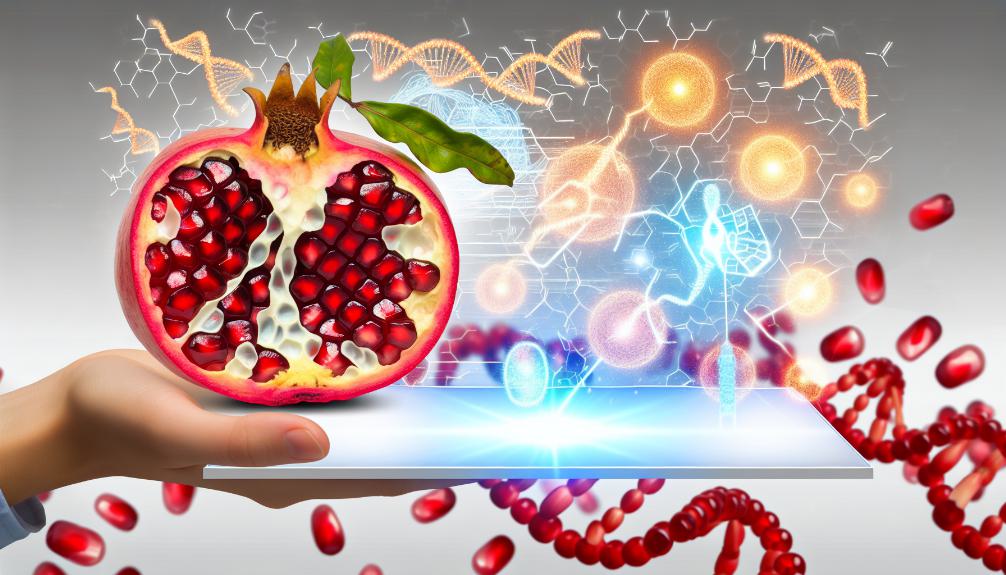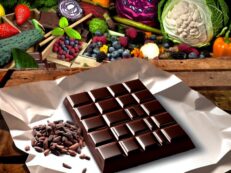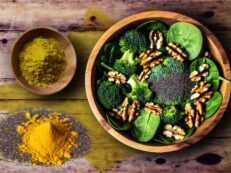
You should consider pomegranate as an Nrf2 activator because of its high concentration of polyphenols, which directly engage and enhance your body's cellular defense mechanisms. Pomegranate's unique compounds, including punicalagins and ellagitannins, effectively activate the Nrf2 pathway, a pivotal player in boosting antioxidant responses and reducing oxidative stress. This activation supports the maintenance of cellular integrity and combats inflammation by inhibiting key inflammatory enzymes. Compared to other activators, pomegranate provides a distinct, robust defense against cellular damage and chronic inflammation. Exploring further, you'll uncover how these mechanisms position pomegranate uniquely in preventive health strategies.
Understanding Nrf2 and Its Importance
Although many mightn't be familiar with Nrf2, it's an essential protein that regulates the expression of antioxidant proteins that protect against oxidative damage triggered by injury and inflammation. As part of the Nrf2 signaling pathway, this protein acts as a master regulator, intricately controlling the gene expression regulation of various antioxidant and cytoprotective genes. This pathway, when activated, binds to the Antioxidant Response Element (ARE) located in the DNA, initiating the transcription of target genes that are crucial for cellular defense mechanisms.
You're not just another bystander in this scientific journey; you're part of a community that values deep understanding and proactive health management. The Nrf2 pathway is your ally, safeguarding your cells from the relentless assault of free radicals and environmental stressors. By enhancing your body's own defenses, you're taking control of your health at the molecular level, joining others who prioritize their well-being through informed choices.
The dynamic regulation of the Nrf2 pathway isn't just a biological process; it's a beacon for those seeking to optimize their health through scientific insight. Embracing this knowledge empowers you to make smarter, more effective decisions about your health interventions and lifestyle adjustments.
Pomegranate's Unique Antioxidant Properties
Pomegranate stands out for its potent antioxidant properties, primarily due to its high content of polyphenols that effectively activate the Nrf2 pathway. As you explore further into the world of pomegranate cultivation, you'll discover that specific techniques enhance the concentration of these beneficial compounds. Advanced juicing techniques are particularly pivotal, ensuring that the maximum amount of polyphenols are extracted. This is important for you, as a discerning consumer or producer, because the method of extraction greatly impacts the efficacy of the antioxidants.
When you choose products derived from meticulously cultivated pomegranates, processed with ideal juicing techniques, you're not just making a purchase—you're investing in a health-promoting ritual that bonds you with a community committed to wellness and scientific advancement. The uniqueness of pomegranate's antioxidant profile isn't just in its ability to activate Nrf2 but in the specific types of polyphenols it contains, such as punicalagins and ellagitannins. These compounds are highly bioavailable and provide a robust defense against oxidative stress, a key factor in maintaining cellular integrity without stepping into the field of enhancing cellular health directly.
Enhancing Cellular Health With Pomegranate
You can greatly enhance cellular health by incorporating pomegranate into your diet, due to its role in boosting antioxidant defenses and reducing oxidative stress. As you explore dietary recommendations for better cellular function, consider the impactful impact of pomegranate. This fruit isn't just a delightful addition to your meals; it's packed with bioactive compounds that activate Nrf2, a protein that regulates antioxidant expression and protects cells from damage.
The juice benefits are particularly remarkable. Drinking pomegranate juice has been shown to increase the levels of antioxidants in your blood, directly contributing to the reduction of oxidative stress at the cellular level. This is important because oxidative stress can lead to chronic diseases and aging. By regularly consuming pomegranate juice, you're not only enjoying a invigorating beverage but also actively participating in a preventive health measure.
Incorporating pomegranate in your daily regime doesn't just support your health; it connects you with a community of health-conscious individuals who value natural, effective ways to maintain wellness. Through shared dietary practices, you'll find camaraderie and support in your journey towards best cellular health.
Pomegranate's Role in Reducing Inflammation
In addition to its antioxidant benefits, consuming pomegranate can greatly reduce inflammation within your body. The fruit's unique compounds, particularly punicalagin and ellagic acid, play pivotal roles in modulating your body's inflammatory processes. This makes pomegranate not only a delightful addition to your diet but also a potent ally in disease prevention.
Here's how pomegranate achieves this:
- Inhibition of Inflammatory Enzymes: Pomegranate juice benefits your system by inhibiting enzymes like cyclooxygenase and lipoxygenase, both of which are instrumental in the inflammatory pathway. This action reduces the production of inflammatory mediators such as prostaglandins and leukotrienes.
- Reduction of Cytokine Production: By decreasing the level of pro-inflammatory cytokines, such as tumor necrosis factor-alpha (TNF-α) and interleukin-6 (IL-6), pomegranate helps in curtailing chronic inflammation, which is linked to a myriad of health issues including cardiovascular diseases and arthritis.
- Oxidative Stress Reduction: Pomegranate enhances the body's antioxidant capacity, thereby reducing oxidative stress, a key contributor to inflammation.
Incorporating pomegranate into your daily regimen isn't just about enjoying its taste; it's about embracing a proactive approach to maintaining health and preventing disease. This shared journey toward wellness fosters a sense of belonging, as you're not alone in prioritizing your health.
Comparing Pomegranate to Other Nrf2 Activators
While pomegranate stands out as a potent Nrf2 activator, it's important to compare its efficacy with other known activators such as broccoli and turmeric. Each of these activators has unique flavonoid content and activation mechanisms, influencing their effectiveness in triggering the Nrf2 pathway, which plays a significant role in cellular defense against oxidative stress.
Pomegranate, rich in unique flavonoids such as punicalagins, offers a distinct mechanism by directly interacting with the Keap1-Nrf2 complex, thereby facilitating the release and activation of Nrf2 more efficiently. In contrast, sulforaphane from broccoli, although highly effective, follows a slightly indirect pathway by modifying critical thiols on Keap1. Turmeric's curcumin, on the other hand, exhibits its role by both direct and indirect means, but its bioavailability often poses a challenge, potentially limiting its overall impact unless taken in optimized formulations.
Here's a quick comparison to illustrate the differences:
| Activator | Flavonoid Content | Activation Mechanism |
|---|---|---|
| Pomegranate | High (Punicalagins) | Direct interaction with Keap1-Nrf2 |
| Broccoli | Moderate (Sulforaphane) | Modifies thiols on Keap1 |
| Turmeric | Variable (Curcumin) | Direct and indirect pathways |
Understanding these nuances helps you appreciate why integrating pomegranate into your diet might offer superior antioxidative benefits, fostering a sense of well-being and belonging in a community mindful of health optimization.
Conclusion
To sum up, you'll find that pomegranate stands out as an Nrf2 activator due to its potent antioxidant properties.
It effectively enhances cellular health and combats inflammation, distinguishing itself from other activators.
By incorporating pomegranate into your diet, you're leveraging its unique ability to modulate oxidative stress and inflammatory responses at a molecular level.
This choice not only supports your body's natural defense mechanisms but also contributes to overall well-being and disease prevention.
Please validate any information here with a healthcare professional. The content is provided for education purposes, This content has not been evaluated by the Food and Drug Administration. Any advice or products mentioned is/are not intended to diagnose, treat, cure, or prevent any disease,










